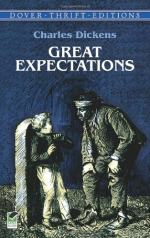|
|
Great Expectations Topic Tracking: Class
Class 1: Pip greatly admires Joe when he's a boy--blacksmith or a prince, Joe's class status makes no difference. It is not until later, when he learns that the world cares about class, that Joe's status matters to Pip.
Class 2: Estella's insults--that Pip is "common" and has coarse hands, hit young Pip particularly hard. He has had no occasion to think about his class status before this, and now that he does, he's disturbed to think he might be "common."
Class 3: Joe's words "that you can't rise out of commonness by being crooked," show that he sees a person's class as a product of their morals and behavior, not of how much money they possess.
Class 4: Biddy tells Pip that Estella is probably not worth loving if Pip has to impress her as a gentleman first; she doesn't buy the notion that love can happen only after one is determined to be of an comparable class. At this stage in his life, however, Pip is not to be swayed from his belief that he'll only get the finer things in life by becoming a gentleman.
Class 5: With the news of his inheritance, Pip gets even more snobby and condescending toward Joe. Pip seems to think that he's made a tremendous leap in class status just by getting richer, and that money has made him a better man than Joe.
Class 6: Although Jaggers associates with "high-class" characters like Miss Havisham, his clients are all from the lower classes. This is a hint that Pip's benefactor, as a client of Jaggers', might not be a gentleman or gentlewoman.
Class 7: Mrs. Pocket is another character with affected notions of class. Instead of responding to the very real need of her six children for a good and attentive mother, she spends her days with her head in the clouds, contemplating dubious connections she might have to Royalty.
Class 8: When Joe visits Pip at Barnard's Inn, he realizes he and Pip are growing apart. He has a much more tolerant attitude about these differences, expressed in his quote referring "blacksmiths, whitesmiths and coppersmiths" on page 260, than Pip.
Class 9: When Pip returns for Mrs. Joe's funeral, he assures Biddy he'll be traveling to the marshes much more frequently, to keep up with Joe. Biddy doubts this; she seems to realize that Pip has distanced himself too much in his own mind from Joe's "type" of person to ever return.
Class 10: Everything changes for Pip when he learns the class status of his benefactor. Suddenly, he is not of gentlewoman's stock, but of prison stock.
Class 11: Magwitch is a victim of rigid class structures, a kind-hearted man who was never able to rise out of the status into which he was born. Compeyson, on the other hand, was born into a better class and consequently, even though he's a crueler man, gets better treatment.
Class 12: Pip believes he can return to the marshes after Magwitch's death and resume life there as if he had never left for London. The fact is, however, that he is a changed man and to go back and live a satisfied life in his old village, would probably be impossible.
Class 13: Ultimately, Pip gets along in the world through his own hard work. His original expectations of being lifted out of his class by means of money, are replaced eventually with a more humble ethic of honest work.




